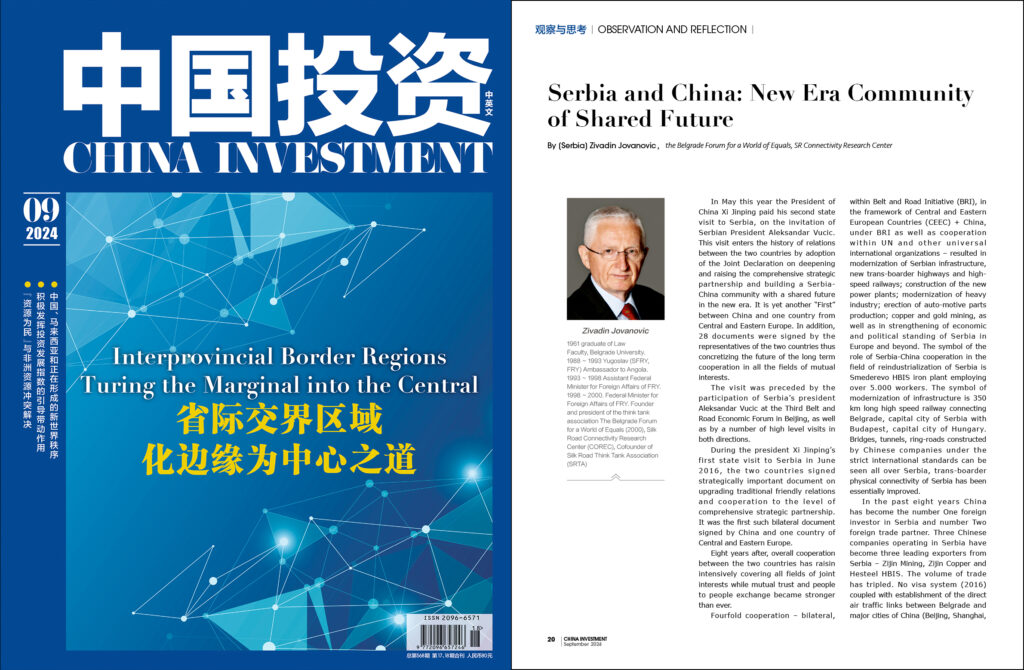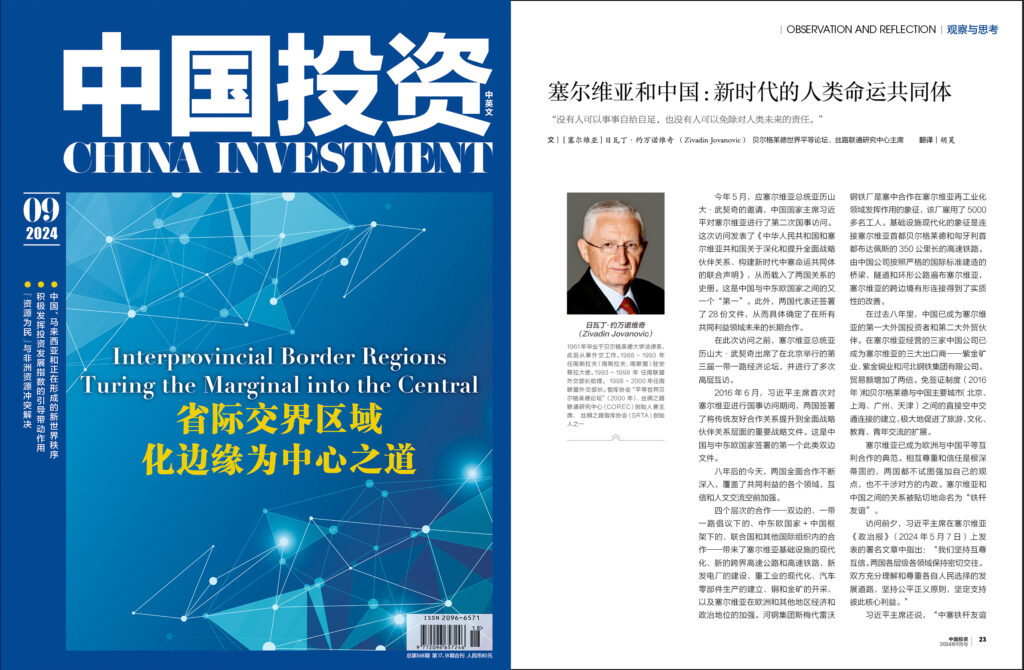Serbia and China: New Era Community of Shared Future塞尔维亚和中国:新时代的人类命运共同体

By [Serbia] Zivadin Jovanovic, the Belgrade Forum for a World of Equals, SR Connectivity Research Center
文|[塞尔维亚]日瓦丁·约万诺维奇 (Zivadin Jovanovic) 贝尔格莱德世界平等论坛、丝路联通研究中心主席 翻译|胡昊
导读
In May this year the President of China Xi Jinping paid his second state visit to Serbia, on the invitation of Serbian President Aleksandar Vucic. This visit enters the history of relations between the two countries by adoption of the Joint Declaration on deepening and raising the comprehensive strategic partnership and building a Serbia-China community with a shared future in the new era. It is yet another “First” between China and one country from Central and Eastern Europe. In addition, 28 documents were signed by the representatives of the two countries thus concretizing the future of the long term cooperation in all the fields of mutual interests.
The visit was preceded by the participation of Serbia’s president Aleksandar Vucic at the Third Belt and Road Economic Forum in Beijing, as well as by a number of high level visits in both directions.
During the president Xi Jinping’s first state visit to Serbia in June 2016, the two countries signed strategically important document on upgrading traditional friendly relations and cooperation to the level of comprehensive strategic partnership. It was the first such bilateral document signed by China and one country of Central and Eastern Europe.
Eight years after, overall cooperation between the two countries has raisin intensively covering all fields of joint interests while mutual trust and people to people exchange became stronger than ever.
Fourfold cooperation – bilateral, within Belt and Road Initiative (BRI), in the framework of Central and Eastern European Countries (CEEC) + China, under BRI as well as cooperation within UN and other universal international organizations – resulted in modernization of Serbian infrastructure, new trans-boarder highways and high-speed railways; construction of the new power plants; modernization of heavy industry; erection of auto-motive parts production; copper and gold mining, as well as in strengthening of economic and political standing of Serbia in Europe and beyond. The symbol of the role of Serbia-China cooperation in the field of reindustrialization of Serbia is Smederevo HBIS iron plant employing over 5.000 workers. The symbol of modernization of infrastructure is 350 km long high speed railway connecting Belgrade, capital city of Serbia with Budapest, capital city of Hungary. Bridges, tunnels, ring-roads constructed by Chinese companies under the strict international standards can be seen all over Serbia, trans-boarder physical connectivity of Serbia has been essentially improved.
In the past eight years China has become the number One foreign investor in Serbia and number Two foreign trade partner. Three Chinese companies operating in Serbia have become three leading exporters from Serbia – Zijin Mining, Zijin Copper and Hesteel HBIS. The volume of trade has tripled. No visa system (2016) coupled with establishment of the direct air traffic links between Belgrade and major cities of China (Beijing, Shanghai, Guangzhou, Tianjin) has greatly facilitated expansion tourism, culture, education youth exchange.- people to people connectivity, in general.
Serbia has become European example of equitable, mutually beneficial cooperation with China. Mutual respect and trust are deeply rooted, none of the two countries tries to impose own views nor to interfere in internal affairs of the other. Relations between Serbia and China have been rightly named – ironclad friendship.
In the eve of the visit, President Xi Jinping in his authored article published in the Serbian daily “Politika” (May 7th, 2024) noted that “the two countries have always respected and trusted one the other maintaining close cooperation at all levels and in all fields. Both countries fully understand and respect the freedom of own people to choose own development route, to plead for the principles of fairness and justice, to firmly support each other’s essential interests”.
The President Xi Jinping said further that “Chinese-Serbian ironclad friendship has been hardened in blood and fire” recalling that 25 years ago, during NATO aggression on Yugoslavia, NATO killed three Chinese journalists in Belgrade. “This we must not forget. Chinese people appreciate peace, but will never permit repetition of historic tragedy. Friendship of China and Serbia which have been dipped by blood of the two peoples has become mutual memory and encouragement for both sides to jointly move forward by big steps”.
The Joint Statement on building Serbia-China community with a shared future in the new era reaffirms that the two countries adhere to the spirit of openness and cooperation, the principles of justice and fairness that they stand for the well-being of the people and national prosperity, as well as for the noble goal of peaceful development of humankind. Serbia and China believe that the development and progress of one country represent an opportunity, instead of a challenge, for other countries in the world.
The two sides emphasized that it is necessary to respect the international order, based on international law and the Charter of the United Nations, while adhering to the principles of independence, equality, sovereignty and territorial integrity of all states, and advocating for multilateral cooperation with the United Nations at the core, while preserving true multilateralism.
Serbia and China have reaffirmed their adherence to equitable and orderly multicolor world and a universally beneficial and inclusive economic cooperation insisting that all countries, regardless of size, be treated as equals, opposing hegemony and power politics, as well as all forms of unilateralism and protectionism.
The presidents of the two countries stated that Serbia and China will continue to firmly support each other in matters of vital state interest on the basis of principles of respect for state sovereignty, territorial integrity and non-interference in the internal affairs.
The Serbian side reaffirmed that the development of friendly relations with the People’s Republic of China is one of the main pillars of its foreign policy. It reiterated its firm support for the one-China principle, stressing that there is only one China in the world and that Taiwan is an inalienable part of China’s territory, as well as that the Government of the People’s Republic of China is the only legitimate government representing all of China.
The Joint Statement underlines that just and sustainable solution of the future status of the Serbia’s autonomous province Kosovo and Metohija should be sought only within the framework of United Nations Security Council Resolution 1244 (1999), through dialogue. The sovereignty, independence and territorial integrity of Serbia have to be fully respected. The Chinese side has reaffirmed its steady support to the efforts of Serbia in finding compromise solutions by peaceful means and called for the implementation of all agreements reached within the Dialogue between Belgrade and Pristina, including implementation of the 2013 Brussels Agreement on establishment of the Community of Serb Municipalities.
The new phase of high-quality development of the Belt and Road Initiative calls for joint efforts in implementation of the agreements reached at the Third Belt and Road Forum for International Cooperation, deepening and expanding cooperation in areas such as economy and trade, investment, science and technology, innovation, the digital sector, as well as information and communications.
Two presidents paid particular attention to upgrading the quality of economic and technologic cooperation, implementation of the innovative technologies and the highest standards of green development. In this regard, they agreed to set up special intergovernmental committee for modern technologic development. President Xi announced that China will accept 50 scientists for specializations in China and provide 300 scholarships for students from Serbia to study in China. China also granted 26 million euro development aid to Serbia.
The Joint Statement underlines importance of active work of both sides for the implementation of the Free Trade Agreement and the Mid-Term Action Plan for Belt and Road (2023-2025), which were signed in October 2023, in Beijing. The Free Trade Agreement which came into force July 1st , 2024, encompasses about 20.000 products and will give new impetus to building community of Serbia and China with shared future in the new era. It is expected that it will further encourage export from Serbia, particularly export of high quality meat, wines, fruits and other products, thus opening the way for growing and more balanced trade.
At the same time, Serbia and China will continue to strengthen practical cooperation in areas such as the construction of transport infrastructure, connectivity, clean energy, industrial investments, agriculture, zones of economic and trade cooperation. It was noted that Serbian section of the Belgrade –Budapest high speed railway will be completed by the end of 2024 while it is expected that Hungarian section will be completed by 2026. Serbia has already imported modern locomotives from China to be operating on the Belgrade – Budapest high speed railway, but on other destinations, too. Negotiations on setting up Chinese locomotives production in Serbia, for regional market, have been initiated. The Chinese side has expressed readiness to encourage its companies to further participate in regional connectivity projects.
Effects of the second state visit of the president Xi Jinping have already been visible in many fields from political dialogue and culture to trade and investments. The delegation of the have Communist Party of China headed by the member of the Politburo of CCCPC Yin Li visited Serbia at the end of May and the delegation of the ruling Serbian Progressive Party paid a return visit to China in July, 2024. Cultural exhibitions have been opened simultaneously in Belgrade and Beijing. Chinese trade center “Eurasia”, one of the largest and most modern in Europe (35.000m2), has been just opened in Belgrade. As of July 1st, about 50% of trade goods move both ways free of any customs duty while the remaining 50% will gradually reach the same treatment within next five years (10% yearly).
Chinese construction companies continue their work on a number of strategically important infrastructural projects in various parts of Serbia. One of the recent such projects is 168 km.long Danube highways Corridor under construction by Shandong Company. Chinese companies are engaged also in construction of the Expo 27 infrastructure and China has accepted to be participant at this important international event to be opened in 2027.
Building a Serbia-China community with a shared future in the new era is the vision of paramount importance. It is expression of the essential interests of the two countries. But, at the same time it may also be inspiration for other countries and governments to join energies in building better future for all, for humanity, as a whole. To abandon practices of divisions, interference, protectionism, inward-reasoning, or even, confrontations. To accept reality that nobody is self-sufficient in everything, or exempted of responsibilities for the future of humanity.
Serbia and China have firm base to advance building community of shared future in the new era. Free trade, free travel, free investments, noninterference, mutual interests, justice and fairness, multi-polar humanity centered world order based on sovereign equality – are the pillars to build it on.

今年5月,应塞尔维亚总统亚历山大·武契奇的邀请,中国国家主席习近平对塞尔维亚进行了第二次国事访问。这次访问发表了《中华人民共和国和塞尔维亚共和国关于深化和提升全面战略伙伴关系、构建新时代中塞命运共同体的联合声明》,从而载入了两国关系的史册。这是中国与中东欧国家之间的又一个“第一”。此外,两国代表还签署了28份文件,从而具体确定了在所有共同利益领域未来的长期合作。
在此次访问之前,塞尔维亚总统亚历山大·武契奇出席了在北京举行的第三届一带一路经济论坛,并进行了多次高层互访。
2016年6月,习近平主席首次对塞尔维亚进行国事访问期间,两国签署了将传统友好合作关系提升到全面战略伙伴关系层面的重要战略文件。这是中国与中东欧国家签署的第一个此类双边文件。
八年后的今天,两国全面合作不断深入,覆盖了共同利益的各个领域,互信和人文交流空前加强。
四个层次的合作——双边的、一带一路倡议下的、中东欧国家+中国框架下的、联合国和其他国际组织内的合作——带来了塞尔维亚基础设施的现代化、新的跨界高速公路和高速铁路、新发电厂的建设、重工业的现代化、汽车零部件生产的建立、铜和金矿的开采、以及塞尔维亚在欧洲和其他地区经济和政治地位的加强。河钢集团斯梅代雷沃钢铁厂是塞中合作在塞尔维亚再工业化领域发挥作用的象征,该厂雇用了5000 多名工人。基础设施现代化的象征是连接塞尔维亚首都贝尔格莱德和匈牙利首都布达佩斯的350公里长的高速铁路。由中国公司按照严格的国际标准建造的桥梁、隧道和环形公路遍布塞尔维亚,塞尔维亚的跨边境有形连接得到了实质性的改善。
在过去八年里,中国已成为塞尔维亚的第一大外国投资者和第二大外贸伙伴。在塞尔维亚经营的三家中国公司已成为塞尔维亚的三大出口商——紫金矿业、紫金铜业和河北钢铁集团有限公司。贸易额增加了两倍。免签证制度(2016年)和贝尔格莱德与中国主要城市(北京、上海、广州、天津)之间的直接空中交通连接的建立,极大地促进了旅游、文化、教育、青年交流的扩展。
塞尔维亚已成为欧洲与中国平等互利合作的典范。相互尊重和信任是根深蒂固的,两国都不试图强加自己的观点,也不干涉对方的内政。塞尔维亚和中国之间的关系被贴切地命名为“铁杆友谊”。
访问前夕,习近平主席在塞尔维亚《政治报》(2024年5月7日)上发表的署名文章中指出:“我们坚持互尊互信。两国各层级各领域保持密切交往。双方充分理解和尊重各自人民选择的发展道路,坚持公平正义原则,坚定支持彼此核心利益。”
习近平主席还说,“中塞铁杆友谊经历过血与火的淬炼”,他回顾说,25 年前,北约侵略南斯拉夫期间,北约在贝尔格莱德杀害了三名中国记者。中国人民珍视和平,但绝不会让历史悲剧重演。中塞两国人民用鲜血凝成的友谊成为两国人民的共同记忆,也将激励双方一道阔步前行。
《关于构建新时代塞中命运共同体的联合声明》重申,两国秉持开放合作精神和公平正义原则,坚持人民福祉和国家繁荣,坚持人类和平发展的崇高目标。塞尔维亚和中国认为,一个国家的发展和进步对世界其他国家来说是机遇,而不是挑战。
双方强调,必须尊重以国际法和《联合国宪章》为基础的国际秩序,坚持各国独立、平等、主权和领土完整的原则,倡导以联合国为核心的多边合作,维护真正的多边主义。
塞尔维亚和中国重申坚持公平有序的多彩世界和普遍有利及包容的经济合作。坚持所有国家,无论大小,一律平等相待,反对霸权主义和强权政治,反对一切形式的单边主义和保护主义。
两国领导人表示,塞尔维亚和中国将继续在国家重大利益问题上坚定地相互支持。尊重国家主权、领土完整和不干涉内政的原则。
塞尔维亚方面重申,发展与中华人民共和国的友好关系是其外交政策的主要支柱之一。塞尔维亚重申了它对一个中国原则的坚定支持。世界上只有一个中国,台湾是中国领土不可分割的一部分。中华人民共和国政府是代表全中国的唯一合法政府。
《联合声明》强调,只有在联合国安理会第 1244(1999)号决议的框架内,通过对话,才能公正、持久地解决塞尔维亚自治省科索沃和梅托希亚的未来地位问题。塞尔维亚的主权、独立和领土完整必须得到充分尊重。中方重申坚定支持塞尔维亚通过和平手段寻求妥善解决方案的努力,呼吁落实贝尔格莱德与普里什蒂纳对话达成的所有协议,包括落实2013年关于建立塞族市镇共同体的《布鲁塞尔协议》。高质量发展一带一路倡议的新阶段要求共同努力执行第三届一带一路国际合作论坛达成的协议,深化和扩大经济和贸易、投资、科技、创新、数字部门以及信息和通信等领域的合作。
两国领导人特别关注提高经济和技术合作的质量、创新技术的实施和绿色发展的最高标准。为此,他们同意成立现代技术发展政府间特别委员会。习近平主席宣布,中国将接收50名塞尔维亚科学家来华学习,并为塞尔维亚学生提供300个奖学金名额。中国还向塞尔维亚提供了2600万欧元的发展援助。
《联合声明》强调了双方为实施2023年10月在北京签署的《自由贸易协定》和《一带一路中期行动计划(2023~2025年)》而积极工作的重要性。《自由贸易协定》于 2024 年 7 月 1 日生效,涵盖约 20000 种产品,将为塞尔维亚和中国在新时代建立具有共同未来的共同体注入新的动力。预计它将进一步鼓励塞尔维亚的出口,特别是高品质肉类、葡萄酒、水果和其他产品的出口,从而为不断增长和更加平衡的贸易开辟道路。
与此同时,塞尔维亚和中国将继续加强在交通基础设施建设、互联互通、清洁能源、工业投资、农业、经贸合作区等领域的务实合作。据悉,贝尔格莱德—布达佩斯高速铁路塞尔维亚段将于2024年底完工,而匈牙利段预计将于2026年完工。塞尔维亚已经从中国进口了现代化机车,用于贝尔格莱德—布达佩斯高速铁路以及其他目的地。关于在塞尔维亚为地区市场生产中国机车的谈判已经启动。中方表示愿意鼓励其公司进一步参与地区互联互通项目。
习近平主席的第二次国事访问已经在政治对话、文化、贸易和投资等许多领域产生了明显的影响。由中共中央政治局委员尹力率领的中国共产党代表团于5月底访问了塞尔维亚,执政的塞尔维亚进步党代表团于2024年7月对中国进行回访。在贝尔格莱德和北京同时举办了文化展览。中国在贝尔格莱德的“欧亚”贸易中心是欧洲最大和最现代化的贸易中心之一(35000平方米)。截至7月1日,约50%的贸易货物双向自由流动免征关税,其余50%的货物将在未来五年内逐步享受同等待遇(每年10%)。
中国建筑公司继续在塞尔维亚各地实施一系列具有重要战略意义的基础设施项目。最近的项目之一是山东公司正在建设的全长168公里的多瑙河公路走廊。中国公司还参与了27届世博会的基础设施建设,中国已同意参加将于2027年开幕的这一重要国际盛会。在新时代建立一个拥有共同未来的塞尔维亚—中国共同体是最重要的愿景。它体现了两国的根本利益。但与此同时,它也可以激励其他国家和政府为全人类的美好未来共同努力。放弃分裂、干涉、保护主义、自行其是,甚至对抗的做法。接受现实,没有人可以事事自给自足,也没有人可以免除对人类未来的责任。
在新时代推动建设共享未来的共同体方面,塞尔维亚和中国有坚实的基础。自由贸易、自由旅行、自由投资、互不干涉、互利共赢、公正公平、以主权平等为基础的多极化、以人为本的世界秩序——这些都是建设共同体的支柱。

